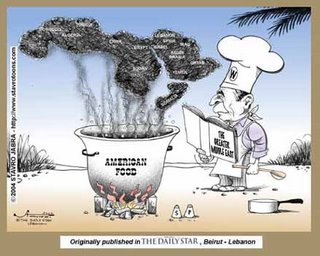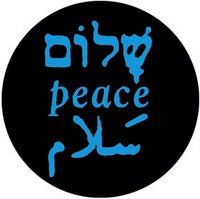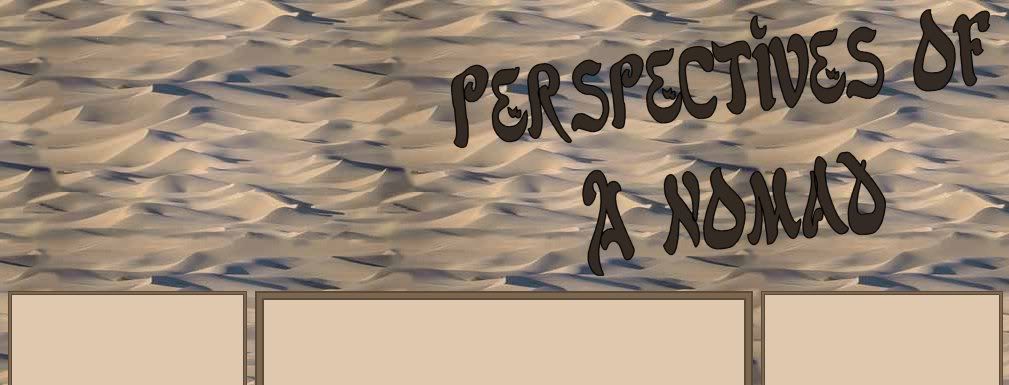Thursday, May 18, 2006
Better Communication a Must between Middle East and West

The Palestinian Chronicle is running a piece this week by Ramzy Baroud called Redefining Middle East. The essay seeks to indict the United States and the West in general for their misperceptions about the Middle East in general, and map out a better method of communication between the Middle East and the West that could lead to better results.
If the US government wishes to escape its miserable fate in that region, it must redefine its relationship with the Middle East: replacing militancy with diplomacy, coercion with dialogue, and racism with partnership.
While there are many sections of the article which I disagree with, the article brings up some very interesting points which bear examination. A better understanding of the concepts behind the article could lead to averting a conflict that we are not ready to engage in.
 Baroud starts by indicating that, while the West as “a politically charged, fractious region, rife with conflicts and disputes, void of many prospects, save those leading to even further uncertainty and turmoil”, history shows us that great nations have emerged out of the Middle East. Baroud is right on target, and does not even scratch the surface: philosophers, theologians, politicians, all the great religion, all have blossomed in the region.
Baroud starts by indicating that, while the West as “a politically charged, fractious region, rife with conflicts and disputes, void of many prospects, save those leading to even further uncertainty and turmoil”, history shows us that great nations have emerged out of the Middle East. Baroud is right on target, and does not even scratch the surface: philosophers, theologians, politicians, all the great religion, all have blossomed in the region.
At the same time, Baroud cannot ignore the military events of the region either. If some of history’s great leaders have arisen out of the Middle East, it must be noted that some of those great leaders were great military leaders. Warfare between the various tribes of the Middle East has been commonplace throughout the region’s history. Still, this does not refute that there have also been times of peace, times of learning, and of prosperity.
I wholly disagree with the author’s indication that the West intentionally portrays the citizens of the Middle East as war mongering, or even as lesser people. I believe that these stereotypes are the result of a lack of understanding between the two cultures, laziness in getting to know a culture that we share this planet with. Baroud sees these stereotypes as a necessary component of our imperialism.
 Appreciating the depth and beauty of a potentially exploitable region can lead to costly hesitation, a loss that empires by definition in need of growth and expansion cannot afford. Therefore, it comes as no surprise that the historic Israeli view of Palestinians either the total denial of their existence altogether, or at best the recognition of a far more inferior breed of human was more or less shaped around the same theme applied in a variety of global historic contexts: Native Americans as ‘uncivilized’, Central American natives as ‘heathens’, Australian Aboriginals as ‘wild dogs’, and so forth.
Appreciating the depth and beauty of a potentially exploitable region can lead to costly hesitation, a loss that empires by definition in need of growth and expansion cannot afford. Therefore, it comes as no surprise that the historic Israeli view of Palestinians either the total denial of their existence altogether, or at best the recognition of a far more inferior breed of human was more or less shaped around the same theme applied in a variety of global historic contexts: Native Americans as ‘uncivilized’, Central American natives as ‘heathens’, Australian Aboriginals as ‘wild dogs’, and so forth.
Baroud then goes on to express his views on Iraq and Iran, views which are not exactly original. But he ends on a strong note. He addresses the Palestinian push for self-determination and redefinition, two themes which I speak about all the time on this blog. This is good stuff here, folks:
The fact of the matter is that the Middle East is eager to define itself according to its own terms and aspirations. It’s neither middle, nor an east, and is not destined to eternal violence and chaos. The imperialist West needs to appreciate the complexities of this region, its richness and its growing potential. It needs to abandon the old Israeli view that "Arabs only understand the language of violence."
If the US government wishes to escape its miserable fate in that region, it must redefine its relationship with the Middle East: replacing militancy with diplomacy, coercion with dialogue, and racism with partnership. Either that or uncertainty and chaos will continue to define the region, and define those foolish enough to perceive the Middle East through trite clichés and meaningless slogans.
Whether or not the governments of the West decide they are willing to trust the governments of the Middle East, it is apparent to me that the author is correct: either the West needs to allow the Middle East to define itself and determine its own future, or the conflict between the West and Middle East will continue to grow.
Baroud points out clearly that the West does not understand the potential and culture of the Middle East, and just as clearly he has shown that the Middle Eastern side does not understand the motivations of the West. As such, I believe the key is communication, and only through communication will we diminish growing tensions between these two cultures.
technorati tags: Palestine, Israel, Middle East, United States, West, US, Europe, Self-Determination, Redefinition
Posted by Scottage at 4:15 PM /
| |




 Baroud starts by indicating that, while the West as “a politically charged, fractious region, rife with conflicts and disputes, void of many prospects, save those leading to even further uncertainty and turmoil”, history shows us that great nations have emerged out of the Middle East. Baroud is right on target, and does not even scratch the surface: philosophers, theologians, politicians, all the great religion, all have blossomed in the region.
Baroud starts by indicating that, while the West as “a politically charged, fractious region, rife with conflicts and disputes, void of many prospects, save those leading to even further uncertainty and turmoil”, history shows us that great nations have emerged out of the Middle East. Baroud is right on target, and does not even scratch the surface: philosophers, theologians, politicians, all the great religion, all have blossomed in the region. Appreciating the depth and beauty of a potentially exploitable region can lead to costly hesitation, a loss that empires by definition in need of growth and expansion cannot afford. Therefore, it comes as no surprise that the historic Israeli view of Palestinians either the total denial of their existence altogether, or at best the recognition of a far more inferior breed of human was more or less shaped around the same theme applied in a variety of global historic contexts: Native Americans as ‘uncivilized’, Central American natives as ‘heathens’, Australian Aboriginals as ‘wild dogs’, and so forth.
Appreciating the depth and beauty of a potentially exploitable region can lead to costly hesitation, a loss that empires by definition in need of growth and expansion cannot afford. Therefore, it comes as no surprise that the historic Israeli view of Palestinians either the total denial of their existence altogether, or at best the recognition of a far more inferior breed of human was more or less shaped around the same theme applied in a variety of global historic contexts: Native Americans as ‘uncivilized’, Central American natives as ‘heathens’, Australian Aboriginals as ‘wild dogs’, and so forth. 